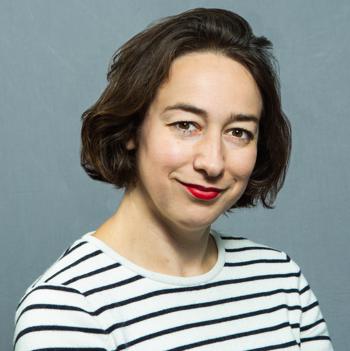
Picture a bar in New York. A group of people led by former BBC News director James Harding is discussing the nature of masculinity. The conversation is so engaging that even the barman raises his hand from across the room to make a point. This is the moment when Merope Mills decided that media start-up Tortoise Media was onto something exciting that she wanted to be a part of.
Harding left his job at the BBC in January 2018 to launch Tortoise with his co-founders, former Dow Jones president Katie Vanneck-Smith, former US ambassador to Sweden Matthew Barzun and Ceci Kurzman. The start-up launched in April last year after a successful Kickstarter campaign to raise an initial sum of £75,000.
Mills, a former assistant editor at The Guardian, joined Tortoise as an editor and partner, along with other journalistic heavyweights including former BBC Radio 4 Today programme editor Ceri Thomas, former HuffPost UK editor-in-chief Polly Curtis, ex-BBC Newsnight journalist Chris Cooke, former Times journalist Giles Whittell and Matthew d’Ancona, as well as arts journalist Arifa Akbar who has since left to become The Guardian’s theatre critic.
The concept is to take a slower, more thoughtful approach to news, like the tortoise of fable, while at the same time opening up the newsroom and inviting its members to be part of the conversation. This is mainly done through ‘Think Ins’, a concept which won in the Innovation category at the British Journalism Awards 2019, where members and guests join journalists and experts at regular meetings around the UK, to talk about the pressing issues of the day.
I was drowning in information, but I wasn’t necessarily getting cleverer or understanding any more.
Information overload
Mills explains: “I was working at The Guardian and thinking the web had brought amazing innovations to how we consume news but there’s a lot out there and too much of it is the same. At the same time, you could see a lot of fake news circulating on social media. I was drowning in information, but I wasn’t necessarily getting cleverer or understanding any more. Tortoise is an attempt to challenge those big movements that have come out of the web.”

She adds: “I loved The Guardian, I’d worked there for 18 years, but I was immersed in so much news all the time online and I sometimes worried if that was for the best. We see misinformation swirling around and I’d think, what does that mean for society? What does it mean for journalism? I sensed a new opportunity would be good. James and Katie are really inspiring people to work for and I thought if anyone can do it, they can.”
“It was seeing a Think In on masculinity that James did in New York. It was held in a bar and there was a moment where the barman put up his hand to say something and he wasn’t sitting with everyone. It was then that I thought people really have stuff that they want to say, and they want to shape the news. That was one of the things that made me think, this is really innovative, they’re really on to something here and I’m going to give this a go.”
Mills was used to attending morning conference at The Guardian, where anyone from an intern to a seasoned journalist who has been working their patch for decades can chip in and she says the same ethos applies at the Tortoise Think Ins.
Being first is not important to us but being best and going deeper is really important to us.
Straight talking
“We do have a rule which is ‘no questions’. Often people hide behind a question when they have something to say and we really want to know what people have to say. I’ve recently done a Think In on digital dating and my colleague just did one on whether higher education was at an all-time low. Our younger membership turned up because they’ve got really strong opinions on those issues. Equally, I’ve done ones on all the consequences of the fact that we’re living longer and how we can age well and that might have an older audience. We did a really successful one on what does class mean today and that was a really diverse room in terms of race, age, and class and sold out. One of the things I love is when you get people who disagree in a room, but they are discussing that disagreement. People seem unable to disagree in a civilised way online, but you get them together in a room and they really can. It’s really enlightening.”
Tortoise organises its journalism around five pillars which are: New Things, encompassing technology, engineering and science; Our Planet, which looks at geopolitics, the environment and natural resources; Belonging, about society, identity, belief and the arts; The 100-Year Life, looking at health, public policy, how we live and education; and Wealth, covering fairness, investment and prosperity.
“The thing we like to say to ourselves is: news, not when it happens, but when it’s ready. Being first is not important to us but being best and going deeper is really important to us. A good example is the ‘My Mother’s Murder’ podcast which tells the story of [the murdered Maltese journalist] Daphne Caruana Galizia. We’ve also got a daily email called The Sensemaker which tries to make sense of the news which you’re hearing. The main thing for us is that we find a way of telling the whole picture,” says Mills.
She adds that stories are covered using whichever medium the team feels is most appropriate. “It’s not just written features, we take the right form for the right story; it might be a podcast, it might be a visual data piece, it might be a written piece. It might be something that goes into The Sensemaker.”
People seem unable to disagree in a civilised way online, but you get them together in a room and they really can.
Membership strategy
Tortoise is a membership organisation, with a ‘Standard membership’ costing £100 for one year, a ‘Founding membership’ costing £250 for two years and a £50 annual fee for the under-30s. In return, members receive between 10 and 20 Think In tickets for them and a guest each year, a quarterly print edition, access to the members-only app and website, The Sensemaker daily email and priority booking for events.
Less than a year after its launch, Tortoise claims to have already reached 28,000 members by December 2019.
“Personal recommendation is one of the biggest ways we’ve grown, which is just people hearing about it from a friend and then we launched the Tortoise Network,” says Mills.
The Tortoise Network aims to combat information inequality, the idea that quality journalism is increasingly being put behind a paywall and is therefore not available to the poorest in society.
Mills says: “The Tortoise Network is an innovation to make sure we don’t have an audience which is all one demographic, one attitude, one perspective. The idea was to have funded memberships for people who might not be able to afford it. Information inequality is rife, lots of good quality journalism is charging now and there was a sense from us that for democracy to work, news needs to be more democratic. The Tortoise Network is about giving everyone a seat at the table. We have supporters who fund membership for people who might otherwise not be able to afford it, so it means that our membership base and our newsroom is filled with different perspectives and incomes and it’s also meant that we could grow,” says Mills.
Tortoise has set up a network of ‘connectors’, including charities and bodies such as the National Citizens’ Service who introduce the brand to people they might otherwise struggle to reach.
Tortoise is already diversifying. Having successfully crowdfunded at its launch, it is now working with crowdfunding publisher Unbound to publish a series of ‘Futures’ books by a variety of authors, edited by Matthew d’Ancona. It is also organising the talks at Kite, a new crowdfunded festival of ideas and music being held in Oxfordshire in June.
The Tortoise Network is an innovation to make sure we don’t have an audience which is all one demographic.
Our USP
How does Tortoise differ from other long form journalism such as that which can be found in The Economist or the New York Times? The difference, says Mills is the concept of inviting members in to help create the news.
“The main thing is the membership involvement. We do peer reviews and member panels. Tortoise is about belonging and together we make the news. We’d be in trouble if the idea was just long form journalism because there’s a lot of that out there already. When we get it right, members see the story evolving and are part of it and we can plug into them and their expertise before it’s published, not just get their feedback afterwards,” she says.
Even Tortoise’s weekly editorial meeting on a Tuesday lunchtime is open to anyone who wants to come along and join in the conversation. Mills says: “There’s a total mix of people; last week there were some students, some Extinction Rebellion activists, it’s different every week. Because these aren’t themed, I thought people might not come to them, but they do, they just want to see what the meeting is like.”
If there has been one big learning from their first year, Mills says it is to slow down even more than they already have done.
“We’ve all worked in a big news organisation and we had to fight our instincts to do things quickly. We knew that people wanted to talk about the news, but in the early days, we probably did too much. Now we have this one big story a week concept, that’s something we try to stick to. We’ve got our three heresies which are: go slow not fast, listen instead of talk, take an interest in what happens next. Not adding to the noise is very hard. We’re doing less in 2020 than our launch year. Quality journalism takes time to produce.”
When we get it right, members see the story evolving and are part of it.
This article was first published in InPublishing magazine. If you would like to be added to the free mailing list, please register here.










